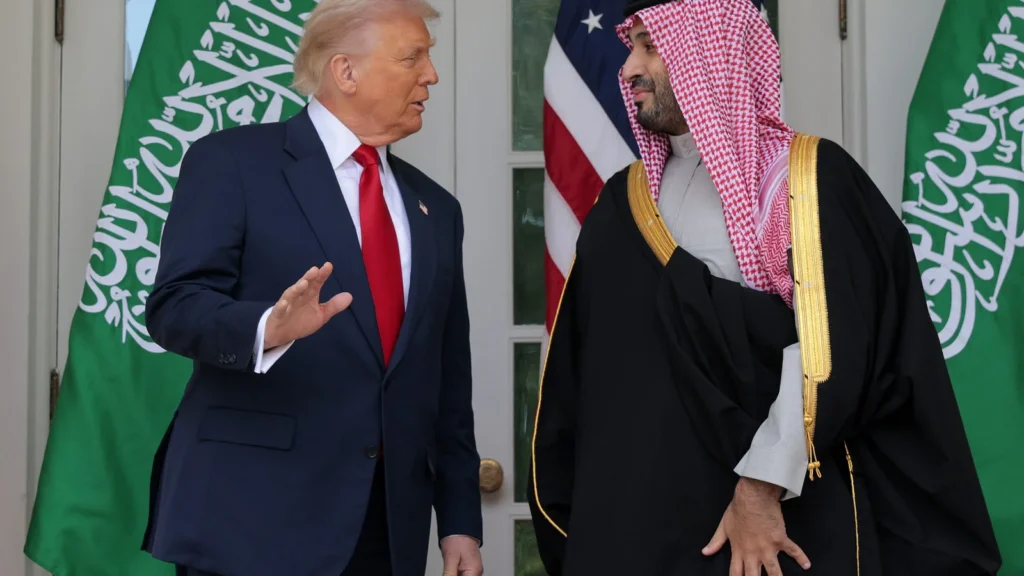A dramatic shift is underway in the global technology landscape. For years, China positioned itself as a central supplier of affordable hardware, AI components and digital infrastructure. But today, several Gulf nations are quietly rewriting the rules. Countries like Saudi Arabia, the UAE, Qatar, and Bahrain are increasingly choosing U.S.-made advanced chips over Chinese alternatives, marking a strategic and symbolic realignment.
This shift is not just about buying technology. It speaks to deeper global power dynamics, national security priorities, economic ambitions and the Gulf’s long-term vision of becoming a global AI powerhouse. As Gulf nations pivot toward the United States for cutting-edge semiconductor advancements, the U.S. finds itself gaining renewed momentum in the global AI race.
The result is a relationship where both sides win: the Gulf gains world-leading technology, while the U.S. strengthens its AI dominance through powerful partnerships in one of the world’s fastest-growing digital regions.
Why the Gulf is Diverting From China
Trust and Security Concerns Drive a New Strategy
For years, China was the go-to partner for infrastructure projects across the Gulf, particularly in telecom, surveillance systems and smart-city development. But as global tensions around data privacy, espionage risk and cybersecurity rise, Gulf nations are becoming more selective.
U.S. semiconductor companies, especially those specializing in advanced AI chips, offer not just performance but also political reliability. America’s tight export regulations force high standards of transparency, which Gulf governments increasingly see as a security advantage over cheaper but less trusted Chinese components.
Security in the digital age is no longer just about borders. It is about who controls your data, who powers your digital infrastructure and who can influence the future of your artificial intelligence models. The Gulf understands this, and its decisions reflect a long-term national strategy rather than short-term cost savings.
Gulf Economies Want Premium Tech, Not Just Affordable Tech
China’s appeal has long been its low cost and massive production capacity. But Gulf nations are no longer shopping for affordable solutions. They are designing digital ecosystems meant to compete globally. AI-driven cities, autonomous mobility, precision health care, and climate technologies require the most advanced chips in the world.
U.S. companies such as NVIDIA, AMD, and Intel dominate the market of high-performance processors used for training large AI models. These chips are not just powerful they are essential. Without them, no nation can build competitive large-scale AI systems.
So while Chinese chips may be cheaper or more accessible, they cannot match the raw computing strength required for the Gulf’s long-term vision.
Western Partnerships Boost Global Credibility
The Gulf wants more than domestic transformation; it wants global influence in AI policy, innovation and governance. Aligning with the U.S. strengthens its credibility on the world stage.
Partnerships in AI and advanced computing also open doors to Western universities, top research labs, multinational tech companies and global investment networks. For nations aiming to become hubs of digital innovation, the benefits are far greater than any cost savings that China might offer.

The U.S. Advantage: Powering the Gulf’s AI Ambitions
NVIDIA at the Heart of a New Tech Alliance
NVIDIA has become the most sought-after chipmaker in the world, and its partnerships with the Gulf are expanding quickly. Gulf governments and sovereign wealth funds have invested billions into acquiring NVIDIA hardware, building new AI datacenters and training local AI systems on American chips.
These investments do more than accelerate regional growth. They help solidify the U.S. as the central engine behind global AI innovation. Every new datacenter built in the UAE or Saudi Arabia using NVIDIA hardware strengthens the United States’ global AI ecosystem.
America’s AI Leadership Extends Beyond Hardware
U.S. dominance in AI is not just about chips. It includes software, cloud computing, research, AI safety frameworks, and a massive ecosystem of startups driving breakthroughs in machine learning.
Gulf nations are eager to plug into this ecosystem. Their partnerships now include:
– Joint AI research between American universities and Gulf institutions
– U.S. cloud companies building datacenters in Riyadh, Dubai and Doha
– American AI labs training models with Gulf funding
– Tech accelerators linking Silicon Valley to Middle Eastern entrepreneurs
These relationships form a bridge between American innovation and Gulf ambition.
Why the Gulf’s Pivot Matters for Global AI Competition
China Loses Ground in a Strategic Region
The Gulf is one of the world’s most influential energy, finance and logistics hubs. Losing it to U.S. partnerships significantly weakens China’s strategic position in emerging technologies.
China still maintains strong ties in areas like infrastructure and manufacturing, but in AI-focused sectors, the Gulf’s new preferences send a clear message: Chinese chips and AI technologies are not seen as future-proof.
As global competition intensifies over who will control the next generation of technology, every region that chooses U.S. hardware strengthens America’s global lead—and weakens China’s bid to dominate AI development.
The Gulf Becomes an AI Power Center
Gulf countries are not just buyers of technology. They are becoming creators. With access to the world’s most advanced chips, they are building huge AI supercomputing clusters, launching national AI strategies and positioning themselves as digital leaders in Asia, Africa and the Middle East.
Saudi Arabia’s Vision 2030, the UAE’s AI Office, Qatar’s digital transformation agenda and Bahrain’s tech-driven reforms all rely heavily on high-performance computing. Their rapid growth is reshaping global tech maps, with American chips powering many of the region’s most ambitious projects.
More Regional Stability and Shared Interests
Strategic tech cooperation often signals deeper political alignment. As the U.S. and Gulf nations intertwine technologically, their national interests become more connected.
This reduces geopolitical risk for both sides and encourages continued investment, research exchange and long-term economic planning. For the U.S., gaining a reliable technology partner in one of the world’s fastest-growing regions is a major strategic win.

Inside the Gulf’s Ambitions: Building AI for the Future
Supercomputers and National AI Labs
Countries like Saudi Arabia and the UAE are developing massive AI computing clusters designed to rival those in Europe and Asia. These clusters rely almost entirely on U.S. chip suppliers.
Their goal is to build national AI models trained on regional data—language, culture, business, climate, energy and governance. These homegrown models can serve government agencies, businesses and startups without depending on Western platforms.
AI in Energy, Infrastructure and Public Services
The Gulf is using AI to transform its key industries:
– Predictive energy management
– Autonomous public transportation
– AI-powered smart city monitoring
– Healthcare diagnosis and preventive systems
– Agriculture, desalination and climate adaptation
– Finance, logistics and customs automation
These systems require enormous computing power and advanced chips for continuous processing. U.S. technology is the backbone that enables this scale.
A New Generation of AI Talent
The Gulf is investing in AI education more aggressively than most regions. Scholarships, talent programs, startup funds and research incentives are designed to train a new workforce capable of contributing to the global AI domain.
Many of these programs are run in collaboration with American universities and tech companies, strengthening U.S. influence in shaping the region’s digital future.
How the U.S. Benefits from This Shift
Strengthening America’s Leadership in AI
Every chip shipped to the Gulf reinforces the U.S. position as the world’s leading AI supplier. Not only does this boost American industry, but it also enhances America’s control of global AI standards, safety protocols and research directions.
Economic Gains and Technological Influence
American chipmakers, cloud companies, and AI labs are experiencing massive demand from Gulf nations. These partnerships generate billions in revenue while giving the U.S. influence over the future architecture of global AI systems.
A Counterbalance to China’s Global Ambitions
The AI race is deeply strategic. Whoever controls the best chips, data, research networks and global partnerships holds decisive power in the digital age.
By aligning with the Gulf, the U.S. strengthens a powerful coalition of nations committed to open innovation, regulated AI development and transparent technological governance.
Challenges and Complexities Ahead
Balancing Political Relationships
The Gulf still values its economic ties with China, particularly in infrastructure and manufacturing. Navigating dual partnerships while leaning toward U.S. technology requires strategic diplomacy.
Managing U.S. Export Restrictions
American chip exports to the Middle East must comply with strict controls designed to prevent misuse or diversion. Gulf nations need to design strong compliance frameworks to maintain access over time.
Building Sustainable Local Ecosystems
Buying advanced chips is only one step. The real challenge is building skilled talent, supporting startups, creating regulatory frameworks and fostering innovation that can stand independently.
Conclusion: A Global Shift With Long-Term Impact
The Gulf’s decision to prioritise U.S. chips marks a turning point in the global AI competition. This is more than a purchasing decision—it is a strategic alignment that shapes the future of global technology.
The U.S. gains a powerful advantage in the race for AI supremacy, supported by nations with massive financial resources, ambitious digital visions and a desire to become global innovation leaders.
At the same time, Gulf nations accelerate their journey towards becoming AI-driven economies with strong international credibility and access to the world’s most advanced technology.
As this partnership deepens, it will influence global markets, reshape geopolitical landscapes, and define which nations lead the next era of artificial intelligence.
Do follow Gulf Magazine on Instagram.
Also Read – Regulations Are What Build a Digital Economy. Saudi Arabia Proves Why



